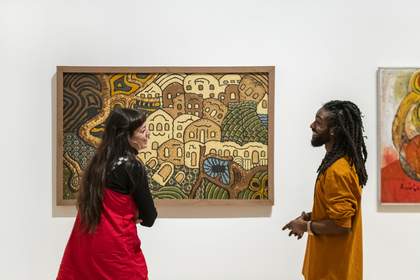Apply for a funded research opportunity at Tate linking to one of our key strategic areas of interest. Expressions of Interest required by 10 December 2025.
Research Opportunity Early Career Fellowship

The Arts and Humanities Research Council (AHRC) has announced funding for early career fellowships in cultural and heritage institutions. This will support each fellow to undertake a two-year research project at one of the UK’s Independent Research Organisations (IROs) such as Tate.
The scheme offers early career researchers of postdoctoral standing the opportunity to gain research and career experience in the galleries, libraries, archives, and museums (GLAM) sector. The Tate fellow will work on a co-designed research project that will also benefit Tate and our activities. Alongside their research, the fellows will undertake a tailored Training and Development Programme, designed for the cohort (approximately 10 fellows) to support researchers working across the cultural and heritage and HEI sectors.
Researchers have until 10 December 2025 to submit an Expression of Interest (EoI) to collaborate with Tate, following this Tate will select one candidate to support to full application.
Tate wants to ensure that fresh perspectives and disciplinary knowledge not commonly found in its museums can be brought to this fellowship, to progress our existing thinking and approach. Tate welcomes applications from researchers who are able to demonstrate a track record of high-quality research in subject areas relevant to the fellowship. We encourage researchers working within a range of disciplines including (but not limited to) the visual arts, curatorship, cultural studies, museum studies, digital, and learning. Researchers should undertake the fellowship in the spirit of a collaborative, mutually beneficial professional exchange with Tate. Fellows should outline how their proposal aligns with Tate’s values of being open, bold, rigorous and kind.
Strategic Areas of Interest
Tate has identified four strategic areas of research interest for this opportunity, and we welcome proposals in these areas.
1. Digital practices and new technologies at cultural organisations
Proposals could include: Cultural organisations’ use of XR experiences as tools for engagement and learning, meeting audience appetite and expectations; Gaming platforms and engagement opportunities through gamification of Tate’s collections, programmes and other activities and utilising external platforms such as Roblox; AI, Ethics and Trust, and how to transparently embed AI into internal and/or audience-facing work; Safeguarding slow/looking, low-fi experiences of art within a bold innovative 21st century art gallery.
2. New narratives: Tate’s early 20th century international collection
In relation to Tate’s international modernist collection, we welcome research proposals which challenge the existing methodologies and dominant narratives of art histories of the early 20th century (1900-1950). Two areas of particular interest are a) sharing interconnected art histories, tracing transnational networks and circuits of exchange in the early part of the 20th century; and b) a focus on works in Tate’s international modernist collection which were acquired by Tate prior to 2000. Research would support reinterpretation of this under-researched collection.
3. British art connections and networks
Drawing on the work of the British Art Network (BAN), proposals might explore its emerging internationalism; test the outer limits of ‘British’ within British art; or examine the impact of global perspectives on British art. We are particularly interested in key collections, spaces, activity and/or knowledge connected with British art in emerging economies, and surveying and interrogating the literature, exhibitions and artistic practice that are bringing non-Western perspectives to bear on British art.
4. Re-examining British art history through a Northern lens
Research would support Tate Liverpool as it approaches its 40th anniversary in 2028, following a major capital redevelopment reaffirming its commitment to Northern England, providing a renewed opportunity to critically challenge prevailing narratives around British art and question our understanding of national art history.
How to apply
If you are interested in applying for a fellowship based at Tate within one of these strategic areas, please contact us via research@tate.org.uk to discuss your idea.
To apply for this opportunity, you can download the EOI from the UKRI website and submit to the Cohort Coordination and Development team at the Victoria and Albert Museum (V&A) by emailing e.rowley@vam.ac.uk by 10 December 2025.
We particularly encourage applications from disabled people and people from black, Asian and minority ethnic backgrounds, as these groups are currently under-represented in the cultural sector. As part of our commitment to inclusive recruitment practices, all Tate staff on the sift panel and subsequent interview panels will have completed unconscious bias training, and care will be given to ensure balanced representation on any decision-making panels. We are committed to ensuring that applicants with protected characteristics and/ or caring responsibilities are supported through this process, and Tate will make adjustments where appropriate.
You can find out more about Tate’s overarching strategic research priorities, our networks, facilities, and resources on our webpages – we hope that you will consider these as part of your proposals.
For further details, including eligibility criteria and timelines, visit: Early career fellowships in cultural and heritage institutions: 2025 – UKRI
To read about the pilot scheme and Round 1 fellowships, visit: Early career fellowships in cultural and heritage institutions: 2023 - V&A
